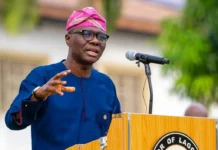 TO check the deteriorating state of infrastructure in Nigeria, the country requires a yearly investment of US$10 billion over the next 10 years, an amount the government cannot provide, according to the Governor of the Central Bank of Nigeria (CBN) Sanusi Lamido.
TO check the deteriorating state of infrastructure in Nigeria, the country requires a yearly investment of US$10 billion over the next 10 years, an amount the government cannot provide, according to the Governor of the Central Bank of Nigeria (CBN) Sanusi Lamido.
Sanusi stated this yesterday at the Public Private Partnership Stakeholders’ forum, organised by the Infrastructural Concession Regulatory Commission (ICRC) and First Bank Nigeria (FBN) Capital in Abuja.
He said the challenges of development in Nigeria were hinged on the provision and maintenance of “adequate infrastructure,” which “the current state of infrastructure in Nigeria poses significant problem.”
He said the current deficit in infrastructure in the country was the major constraint to “achieving the national vision of becoming one of the 20 largest economies by 2020,” as 70 per cent of the 193,000 km of roads in the country is in a poor condition.
While citing poor power supply, as 60 per cent of the population lacks electricity supply “over US$13 billion is spent annually on fuel generators.” Sanusi said it was unacceptable that Nigeria did not have a functional railway line.
He maintained that building infrastructure was capital intensive and “lenders can only be paid from the revenues generated by the projects.”
He said “one potential solution is the use of pension funds of over N2.3 trillion, which yields predictable streams of income in the long term, hedge against inflation and is less volatile.”
He spoke on the theme “The role of development finance institutions and infrastructure development, lessons from India and Brazilian Development Bank (BNDES), stressing that the “private sector was the best option Nigeria had despite the options available. Because “they deliver value for money in public service procurement and operations” and enable the public sector to raise capital and bridge the financing gap.
The Director General of ICRC Mansur Ahmed, in his address said infrastructure development in Nigeria cannot be done in isolation of the private sector as the “concern in both the developed and developing economies of the world collectively affects everyone, not just the government.”
He said “successful macroeconomic enhances the benefits of good infrastructure but cannot replace it.”
The call on the government to provide the tools and legal framework that will be sustained by subsequent administrations, devoid of political undertone, was loud.




